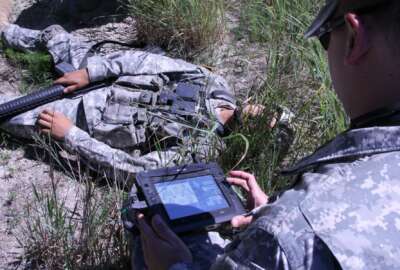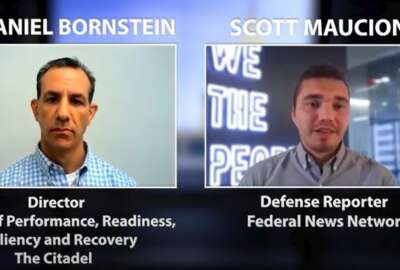
The latest from a foundation dedicated to military medicine
A foundation dedicated to the furthering military medicine is about to celebrate 40 years. It was signed into law by President Reagan, and later named for the...
A foundation dedicated to the furthering military medicine is about to celebrate 40 years. It was signed into law by President Reagan, and later named for the Senator who sponsor the bill authorizing it. For what it does and how it works with the military, the Federal Drive with Tom Temin spoke to the president and CEO of the Henry M. Jackson Foundation for the Advancement of Military Medicine, Dr. Joseph Caravalho.
Interview transcript:
Tom Temin
And we should point out that you practiced military medicine for an army career, at which you retired as a major general.Joseph Caravalho
That’s right. Before I went into executive medicine, I was a nuclear cardiologist.Tom Temin
Nuclear cardiologist, that’s pretty high tech.Joseph Caravalho
No, all cardiology is high tech. So, I was just running the mill, if you will.Tom Temin
All right. And that gets to the question I think we should establish first, is what is the definition of military medicine? People think of battlefield injuries as something, which in fact, the military does specialize in and does advanced trauma care. But it’s more than that, isn’t it?Joseph Caravalho
Yeah, I’d like people to think about medicine in general and then with adding the adjective military, it’s for whom the medicine is applied. So imagine that you want to make our warfighters more agile, more resilient, more survivable. And what does that take within the health care spectrum? So it is promoting wellness, is protecting health, it is preventing illness, it is then treating caring, rehabilitating and reintegrating.Tom Temin
Now, the military itself has a large medical research apparatus. There’s also the [National Institues of Health (NIH)], government wide, and the Veterans Affairs Department. All have research arms and are always looking to further the medicine. Where does the foundation fit into this whole apparatus?Joseph Caravalho
So military medicine is unique in that it is focused on the warfighter. So everything that is done, research wise, for their benefit must be done to fill a gap for the warfighter. And that’s different than NIH or some of the other funding organizations. [Henry M. Jackson (HJF)] is an implementing partner to the research that is done within the [Department of Defense (DoD)]. So as you mentioned, it is authorized by Congress. But we are a civilian nonprofit, who together is working with the DoD to conduct research and development programs.Tom Temin
And give us a sense of the scope of the organization. It’s not just a few people in some labs here in there.Joseph Caravalho
Well, we have approximately 3,000 people, and we’re in 14 countries worldwide. Mostly distributed within the Maryland area. But two-thirds or more of them within the United States and then sprinkled across Southeast Asia, Africa, and Europe.Tom Temin
And before we get to the research itself, how does it get conducted? That is to say, does the foundation employ staff that are researchers in laboratories themselves? Or do you funnel grant money to academia, for example?Joseph Caravalho
Yeah, so probably a good time to tell your listeners the word foundation was given to us by Congress. But it’s a little bit of a fake out now, because people think, well, if your foundation you’re granting money to do research. We are simply the swiveling entity, the foundation was to demonstrate were civilian entity, partnering with the military to conduct research. So when a researcher wants to do a study, they need to buy equipment, they need to employ people, bring on scientists, that’s primarily what we do. So our contribution ranges from world class scientists to research assistants and administrative assistants.Tom Temin
And therefore the work of research is done by foundation members.Joseph Caravalho
That’s correct. So the DoD put out a list of the top 10 things that they have accomplished since 9/11. HJF has been integral to eight of those things.Tom Temin
Interesting. We’re speaking with Dr. Joseph Caravalho. He is the president and CEO of the Henry Jackson Foundation for the Advancement of Military Medicine. So your priorities come from DoD?Joseph Caravalho
That’s correct.Tom Temin
And you mentioned there were some efforts since 9/11, that the foundation was active. Tell us about some of those.Joseph Caravalho
What we’ve learned in our period of war that has, I’m very proud his translate into civilian health as well. Number one is the importance of controlling bleeding, and the use of tourniquets, and other devices. Such as a resuscitative balloon occlusion of the aorta device, with which we worked with the inventor, to show how you can stop excessive bleeding, while controlling the bleeding while conducting resuscitation of the individual.Tom Temin
Interesting. So that is in that trauma area. But then there are other areas beyond that.Joseph Caravalho
Sure, probably 80% of individuals who are unable to be fully employed, are related to disease and what we call nonbattle injuries. Not wounds from war from a shrapnel and gunshot wounds, etc. So of those primarily illness, so a lot of effort is done within the vaccine world, to prevent illness. As you can imagine a soldier, sailor, airman and Marine, may be called by the President to go anywhere in this world, on a moment’s notice. So it’s more important to have a vaccine than it is to have a treatment for an illness. We don’t want the troop to get the ill in the first place. So a lot of effort in on infectious diseases.Tom Temin
And Congress has been busy on some other fronts, too. And that has affected VA payouts. And that’s in the area of Agent Orange exposure, in recent years. Finally, that came to a head and legislation was passed. And now more recently, burn pits, which would be mainly in Afghanistan in Iraq affair. But also exposure to those types of chemicals and burning types of exposures. Going back, I think, to Korea, in this case, or at least Vietnam. For those payouts, have you done research in some of those areas?Joseph Caravalho
So we are primarily on the military side or the active duty side. So the VA investigators are heavily involved in that aspect. After the fact, as we see that the DoD is focused on how can we prevent such things, such exposures, such illnesses associated with those in the future? And that’s where we’re involved.Tom Temin
Got it. So what are some other projects going on of interest?Joseph Caravalho
A lot of the COVID work was done by the military and we were involved with that. A lot of HIV research is is being done. There’s TBI worked on, PTSD worked on, sleep studies, performance optimization, it really is a cross cutting. Anything that can help a warfighter, that you might imagine, is in there. And this is probably a good time to say that. What’s so exciting about this, is even though all our work must be focused on the warfighter, it’s just a couple of chess moves away from knowing, that can also benefit a civilian. So the vision is to promote not only military health, but also civilian health.Tom Temin
Right, there have been examples, for example of VA working and different organizations working with groups like the NFL, because head injury is head injury, regardless of the source.Joseph Caravalho
That’s great. What’s unique about that, though, is the trauma to the brain can be cumulative and impactful with a long-term bad outcome possible. But, blunt trauma effect on the brain is different than barrel trauma effect on the brain. That’s what we’re finding. And the barrow trauma comes from explosions. You can imagine someone who’s trying to breach a dwelling, or using a bazooka like armament, is a different pressure on the brain. And we’re finding that’s different. So we look at it differently.Tom Temin
And so that kind of research can actually affect how training is done too, is not just warfare, per se. But training, you’re also exposed to these kinds of pressures. And that’s dangerous.Joseph Caravalho
That’s correct. In fact, another 80% rule is 80% of TBI, or it was a mild concussion occurs in training, not in deployment.Tom Temin
And I wanted to ask you about mental health, because when you mentioned PTSD, performance enhancement and optimization, that bridges the mind and the body. And of course, suicide prevention and mental health issues in general have become major focuses for, again, the veteran population and the active duty.Joseph Caravalho
That’s right. I’m really proud of the DoD, it’s a whole person approach to human health. So they look at it within the human domain. So it’s how can someone perform optimally, in austere conditions, with the stresses of deployment or combat going forward? So all aspects, again, prevention, protection, and then treatment or play. And I’m very pleased that it isn’t all, what we say, left of the boom. How can you prevent the boom from happening in the first place?Tom Temin
Sure. And so what would you say are the grand challenges for military medical research in the near term?Joseph Caravalho
I think the definition of where our warfighters are going to be fighting and under what conditions and against what adversary, is what DoD is looking at. And that changes then the requirements. So if you are fighting a near peer, let’s say as an example, or your remote, or you’re in the middle of the ocean. Your need to care for that individual for a longer time, is greater. So what is needed to do that? What telemedicine is needed? How can you extend the reach of the surgeon to a nonsurgeon, so that resuscitation can occur earlier? How can we keep people alive longer until they reach the surgeon? Those are all exciting challenges that face us now.Tom Temin
And we’re seeing different nature of war. If you look at what’s going on in Ukraine, that looks like old fashioned battlefield, land warfare, that everyone said was obsolete. But yet, if you look at what something say, God forbid, a conflict with China would look like. It could be conducted by almost, totally remote means. Uncrewed, unmanned types of weapons and craft, which maybe takes more people out of physical danger. But then that gets back into that idea of of the mental danger.Joseph Caravalho
Right, and add to that the cyber threat, that you can take down systems that you’re relying on, that are internet based.Tom Temin
All right, and I should ask you too, what does all this cost to operate the foundation? Is it appropriated funds?Joseph Caravalho
Well, so Congress doesn’t give us money. It is, when there’s a research award or funding stream from some source, and people need help to facilitate that, we partner. So if you look at in 1990, we managed $10 million of awards. In 2022, we’re managing over $500 million of federal awards, going forward. So that just speaks to the scale and the agility and the long lasting nature of HJF over the years, and the trust that DoD has in in work with. They don’t have to work with us, but we feel and we strive every day to be the partner of choice.Tom Temin
But you’re out there competing with Johns Hopkins and the other famous medical research institutions.Joseph Caravalho
Well, for DoD research, yes. We have academia is looking to partner with DoD industry, other NGOs and other nonprofits. So it’s a tough world, but we’re very proud of the team that we have going to get.Tom Temin
And you keep getting reauthorized.Joseph Caravalho
Well, the authorization is good. So it’s not a time limited authorization. But just as we were put in, Congress could take us out. So I do believe that they’re confident, that we’re doing a good job in supporting DoD.
Copyright © 2025 Federal News Network. All rights reserved. This website is not intended for users located within the European Economic Area.
Tom Temin is host of the Federal Drive and has been providing insight on federal technology and management issues for more than 30 years.
Follow @tteminWFED
Related Stories





